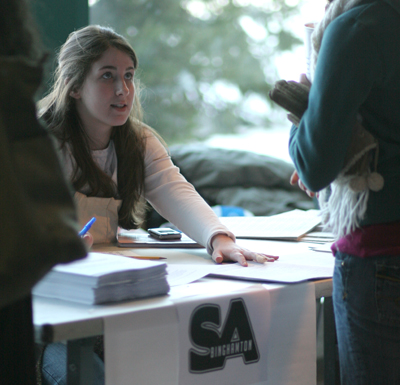
Students voted Wednesday in favor of the proposed amendments to the Student Association Constitution as well as the proposed increase of the Student Activity Fee by $2, making it $86.50. Voting took place at a table in the New University Union for six hours ‘ and of the 600 ballots for the referendum that were printed, 92 were used.
Of those 92, 75 voted in favor the changes, and 82 voted to increase the Student Activity Fee. ‘Voters were fairly equally distributed from all over campus, including residence halls and off-campus communities,’ said Elections Chair Michael Boykin, a junior political science and accounting major.
Despite the low turnout ‘ roughly 7 percent of the student body voted ‘ Boykin said he felt he did enough to get the word out, including advertising in campus media, on B-Line, distributing fliers and telling community representatives. But with the March 5 and 6 election for SA e-board members less than two weeks away, Boykin said he would be ‘doing more’ to raise student awareness about the elections.
‘I’m obviously not going to get the whole school,’ he said. ‘The biggest problem is that people are just lazy. In my experience people off campus, or in Hillside, tend to be more apathetic than the rest of campus, for the most part.’
Boykin added that he had already received e-mails asking, ‘Why it wasn’t in B-Line or in Pipe Dream ‘ but it was there.’
Spring voting on proposed changes to the Student Association constitution is normally held at the same time as Student Assembly elections, but because the results of the referendum directly affect the position of the executive vice president, as well as other aspects of the upcoming elections, the Assembly elected to hold the vote early.
According to Boykin, the elections committee and the Assembly agreed that students should be able to vote in the dining halls and the New Union, ‘But [the SA] just couldn’t get enough poll sitters to do it.’
He added that his committee is looking into electronic voting, possibly through BlackBoard, for future elections.
The referendum proposed a change in the duties of the executive vice president. The EVP will no longer chair the Student Assembly meetings, a responsibility that will now be that of the Assembly chair, a new position. The passing of the referendum also created the Student Group Council, which is expected to increase communication between organizations and the student government.
Since more than two-thirds of the vote was in favor of changing to the SA proposed referendum, the changes ‘ which also included removing the New York Public Interest Group’s two seats on the Assembly and putting the Intercultural Awareness Committee under the vice president for multicultural affairs office ‘ were passed overwhelmingly.
The other issue taken to vote was the increase of the Student Activity Fee. The raise is in part a result of the debt that the Student Association Programming Board (formerly titled the University Programming Board) has accumulated over recent years. The increase is expected to bring in roughly $45,000 more for the office, increasing the budget and the office’s capacity for bringing acts to campus.
‘Everyone’s always complaining about programs and concerts,’ said Fiona Peach, an off-campus representative and a senior economics and political science major. ‘Now this will do something about it.’
Boykin also urged students to e-mail him any comments or questions about the elections at mboykin1@binghamton.edu.


